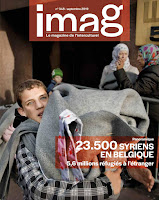Weekly News Egypt 18 - 25 June
Top News: Debate rages over Constitution or elections first options
The official plan in Egypt, as presented by the High Council of the Armed Forces is still to have parliamentarian elections in September 2011. According to article 60 of the provisional constitution submitted by the HCAF to a referendum in March 2011 and approved by 77% of the voters, the elected parliament would create a constitutional assembly of 100 members. This assembly would present a new draft of the constitution to a new referendum within 6 months after its creation. There are currently 5 different trends which tend to amend or completely review this pathway.
- No less than 40 political parties, groups and coalitions have called for a million man protest 8 July making it clear that if Egypt's new constitution is not written first before parliamentary elections there will be a resumption of the sit-in at Tahrir Square. The million man protest is to be called "Correcting the Track Friday" and is another step in the "Constitution first" campaign in the country. When the campaign was announced, its main aim was to collect 15 million signatures on a petition demanding the constitution be drafted before parliamentary elections. The tenants of this position are mainly liberal and secular forces, opposed to Islamic trend parties which announce their backing to the planned process.
- In respect to the March referendum results, the first free referendum in decades, there are nevertheless leftists, centrists and even liberals who agree to have elections first, under the condition that these elections are somewhat postponed. The reason is to give the time to parties to organise their campaign, but also for rebuilding a fair security sector (a referendum cannot be compared to a parliamentary election in term of electoral violence), and… draft an elections law. One of the liberal faces that joined this front is Amr Hamawzy, political science professor at Cairo university and founder of Masr Al-Hureyya, a liberal party.
- Alongside the two main sides in the debate there is a third team of activists and political groups that believe the discussion is a waste of time. Activist Ibrahim Houdabi told Ahram Online that the dilemma of constitution or elections first would not be resolved. "We should pay attention to the street, to the people who are fed up with these endless discussions and who have got other problems," Houdabi says. Wael Ghonim and the We Are All Khaled Said Arabic Facebook page are currently calling for an initiative to help the poor in Egypt under the name, "The poor first."
- Presidential contender Mohamed ElBaradei was among the first advocates of the "Constitution first" position, yet during an interview on Egyptian national TV recently he took a step back, revealing that he sat with Field Marshal Tantawi and General Samy Anan and that he was told that the drafting committee would represent all significant national political forces. However, there is still a question on how that assembly's members will be chosen. ElBaradei stated that he got positive assurances from the interim ruler. ElBaradei is focused instead on proposing an Egyptian "Bill of Rights" (see below articles). He believes such a bill should have precedence over the constitution, considering that it would deal with the basic rights of the Egyptian citizen. The proposed bill of ElBaradei asserts that Egypt is a civil state in its first article.
- Another potential presidential candidate offered a completely different view from that of all other politicians. Former Arab League chief Amr Moussa said on his Twitter account in Arabic (see below article) that presidential elections should be held first. According to Moussa, "If we have a president with limited powers based on what is mentioned in the constitutional declaration, he can regulate and organise the coming critical period."
Main source:
